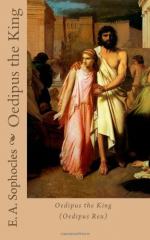|
This section contains 301 words (approx. 1 page at 400 words per page) |

|
Oedipus the King Summary & Study Guide Description
Oedipus the King Summary & Study Guide includes comprehensive information and analysis to help you understand the book. This study guide contains the following sections:
This detailed literature summary also contains Bibliography and a Free Quiz on Oedipus the King by Sophocles.
Sophocles's Oedipus Rex is probably the most famous tragedy ever written. It is known by a variety of title (the most common being Oedipus Rex), including Oedipus the King and Oedipus Tyrannus. Sophocles, first produced the play in Athens around 430 B.C. at the Great Dionysia, a religious and cultural festival held in honor of the god Dionysus, where it won second prize. In the play Oedipus, King of Thebes, upon hearing that his city is being ravaged by fire and plague, sends his brother-in-law Creon to find a remedy from the Oracle of Apollo at Delphi. When Creon returns Oedipus begins investigating the death of his predecessor, Laius, and discovers through various means that he himself was the one who had unknowingly killed Laius and then married his own mother, Jocasta. Jocasta commits suicide, Oedipus blinds himself, takes leave of his children, and is led away. Aristotle praises the play in his Poetics for having an exemplary, well- constructed plot, one which is capable of inspiring fear and pity not only in its audience but especially in those who have merely heard of the story. Following Aristotle's appraisal, many prominent authors including Voltaire, Fredench Nietzsche, and Sidmund Freud reacted at length to the play's themes of incest and patricide. In the twentieth century, the most influential of these thinkers, Freud, showed that Oedipus's fate is that of every man; the "Oedipus Complex" is the definitive parent-child relationship. Throughout history, writers have drawn upon the myth of Oedipus, and dramatists, composers, and poets, including Pierre Corneille, Frednch von Schiller, Heinrich von Kleist, William Butler Yeats, Ezra Pound, Igor Stravinsky, and Jean Cocteau, have both written on, translated, and staged the tragedy; contemporary filmmakers such as Pier Paolo Pasolini and Woody Allen have directed self-consciously autobiographical versions of Oedipus Rex,
Read more from the Study Guide
|
This section contains 301 words (approx. 1 page at 400 words per page) |

|



